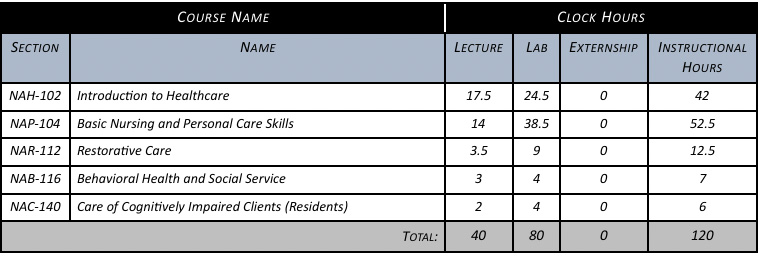Nurse Aide Program
1 Month – Total Clock Hours: 120
FY 2026 Tuition: $1,950
Start dates for 2025:
7/7/25, 9/2/25, 10/27/25
Admission Requirements
Application Fee, Application for Admission, Enrollment Agreement, Accuplacer entrance exam, Criminal Record Check, Child Abuse Clearance.
Students are required to have a completed physical and a 2-step Mantoux/QuantiFERON TB Gold Plus test to rule out TB prior to the start of class. If the applicant’s 2-step Mantoux test is positive, a chest x-ray must be performed prior to the start of the program and be read by a healthcare professional, stating that no active tuberculosis is present. The Nurse Aide Coordinator is responsible to verify the applicant’s physical and 2-Step Mantoux / QuantiFERON TB Gold Plus test forms for accuracy and completeness prior to the start of class.
Program Overview
This course is for anyone wanting to work as a certified nurse aide. The course includes 40 hours of classroom instruction and 80 hours of laboratory/clinical experience. After successful completion, students have the opportunity to take the nurse aide certification exam. Students must have Act 14 clearance, physical, and 2‐step PPD test prior to enrollment.
Maximum # of Students Per Class: 20
Schedule is 4 days per week).
Please check with Nurse Aide Coordinator (smbrungart@cpi.edu) and review the Program Enrollment Agreement for specific start dates.
Entry-Level Career Opportunities:
- Certified Nurse Aide
- Direct Care Worker
- Home Health Aide
- Personal Care Aide
Courses In This Program Include:

Course Descriptions
NAH-102 – Introduction to Heath Care
Introduction to Heath Care, students are introduced to the role and function of a nurse aide, communication skills, infection control, safety/emergency, client’s rights, and client’s independence. This section gives students a better understanding of common health care terms, job duties of a nurse aide, and a better understanding of a client. In the Role and Function unit, students are taught what is expected of nurse aides, different employment options, and Act 13/Act 14. Students are introduced to communication skills, effective communication, and cultural diversity. Lessons include information about infection control, the importance of hand washing, and personal protective equipment. Safety and emergency situations are explored. Students learn proper body mechanics, safety for clients, and disaster procedures. The instructor also teaches about client’s rights and independence. Students are taught to demonstrate behavior that maintains a client’s rights and to promote independence that prevents abuse. (17.5 Lecture Hours – 24.5 Lab Hours)
NAP-104 – Basic Nursing and Personal Care Skills
Basic Nursing and Personal Care Skills contains information on nutrition, identifying and reporting conditions of the body systems, a client’s environment, personal care, and care for a client during the death and dying process. In this course students are taught about modified diets for client’s, correctly feeding the client and proper documentation at meal completion. Students will be able to identify and report abnormal signs and symptoms of common diseases and conditions of the body systems. This course stresses the importance of recognizing and reporting unsafe conditions in the client’s environment. Emphasis is made on the importance of maintaining a safe environment. The Personal Care Unit includes information such as bathing, nail care, catheter care, and accurately measuring / documenting intake and output. The student is also taught how to provide care for a client who is dying and how to provide postmortem care. (14 Lecture Hours – 38.5 Lab Hours)
NAR-112 – Restorative Care
Restorative Care discusses the principles of bowel and bladder training, activities of daily living, proper use of assistive devices, and passive/active range of motion exercises. Students are taught how to assist clients with proper techniques of restorative care. (3.5 Lecture Hours – 9 Lab Hours)
NAB-116 – Behavioral Health and Social Service Needs
Behavioral Health and Social Service Unit introduces students to the psychosocial effects of aging and the disease process. This unit teaches students how to interact and promote care for a client who may have behavioral health diagnoses or social service needs. (3 Lecture Hours – 4 Lab Hours)
NAC-140 – Care of Cognitively Impaired Clients
Care of Cognitively Impaired Clients Unit discusses strategies used when caring for this population. This unit emphasizes the importance of recognizing and reporting condition changes from a client’s normal function. In this section strategies and utilizing techniques such as validation therapy are discussed.(2 Lecture Hours – 4 Lab Hours)
